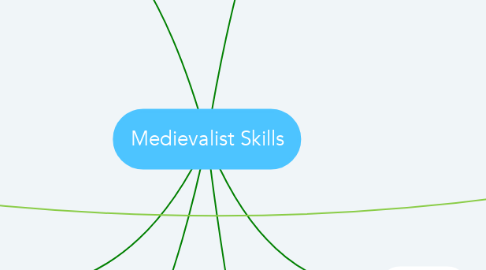
1. Perseverance
1.1. Study Skills
1.1.1. Task Awareness (1)
1.1.1.1. Manage Tasks (2)
1.1.1.1.1. Completion (3)
1.1.1.1.2. Roadblock (3)
1.1.1.2. Mindmap (2)
1.1.1.2.1. Kanban (3)
1.1.2. Time Awareness (1)
1.1.2.1. Manage Time (2)
1.1.2.2. Pomodoro (2)
1.1.3. Syllabus (1)
1.1.4. Note-taking (1)
1.1.4.1. Advanced Note-taking (3)
1.2. Writing
1.2.1. Simple Prose (1)
1.2.1.1. Academic Prose (2)
1.2.1.1.1. Breaking the Mould (4)
1.2.2. Bibliography (1)
1.2.2.1. Annotated Bibliography (2)
1.2.2.2. Footnoting (2)
1.3. Digital Tools
1.3.1. Password Managment (1)
1.3.2. Software Use (1)
1.3.2.1. Software Customization (2)
1.3.2.1.1. Intermediate Software Use (3)
1.3.3. Online Resources (1)
1.3.3.1. Online Accounts (2)
1.3.3.1.1. Online Contributions (3)
1.3.3.1.2. Search strings (3)
1.3.4. Finding Data (1)
1.3.4.1. Structuring Data (2)
1.3.4.1.1. Visualizing Data (3)
2. Constitution
2.1. Body
2.1.1. Activity (2)
2.1.1.1. Exercise (3)
2.2. Mind
2.2.1. Reflection (2)
2.2.1.1. Self-Care (3)
2.3. Awareness
2.3.1. Support (1)
2.3.1.1. Cry for Help
2.3.1.1.1. Offering Help
2.3.2. Visiting Physician (1)
3. Wisdom
3.1. Deduction
3.1.1. Truthiness (1)
3.1.1.1. Intuition (3)
3.1.1.1.1. Evaluating Hypotheses
3.1.2. Developing a Hypothesis (1)
3.2. Integrity
3.2.1. Code of Conduct
3.2.2. Avoiding Plagiarism
3.2.2.1. Recognizing Plagiarism
3.2.2.2. Maintaining Academic Intergrity
4. Intellect
4.1. Chronological Thinking
4.1.1. Timeline
4.1.1.1. Patterning
4.1.1.1.1. Periodization
4.2. Historical Comprehension
4.2.1. Context
4.2.1.1. Questioning
4.2.1.1.1. Fields
4.3. Historical Research
4.3.1. Simple Search
4.3.1.1. Basic Academic Search
4.3.1.1.1. Intermediate Search
4.3.1.2. Catalogue
4.3.1.2.1. Advanced Catalogue
4.3.1.2.2. I.L.L.
4.3.1.2.3. Library Genesis
4.3.1.2.4. Book Hoard
4.3.2. Basic Source Criticism (1)
4.3.2.1. Looking (2)
4.3.2.2. Intermediate Source Criticism (2)
4.3.2.2.1. Advanced Source Criticism (4)
4.4. Historical Analysis
4.4.1. Facts (1)
4.4.2. Opinion (1)
4.4.2.1. Interpretation (2)
4.4.2.1.1. Ambiguity (3)
4.4.2.1.2. Advanced Interpretation (3)
5. Dexterity
5.1. Scrutiny
5.1.1. Feedback (1)
5.1.1.1. Proofreading (2)
5.1.1.1.1. Critical Feedback (3)
5.2. Translation
5.2.1. Language recognition (1)
5.2.1.1. Etymology (2)
5.2.1.1.1. Simple Translation (3)
5.3. Creativity
5.3.1. Historical Imagining
5.3.1.1. Experimental Medievalism
5.3.2. Re-enactment (1)
5.3.2.1. Cooking (2)
5.3.2.2. At War (2)
5.3.3. Gaming (1)
5.3.3.1. Historically-Aware Gaming (2)
5.3.3.1.1. Critical Game Studies (4)
5.3.4. Artisan (1)
5.3.4.1. Medieval Techniques (2)
5.3.4.1.1. Ink making (3)
5.3.4.1.2. Paper making
5.3.4.1.3. Parchment making
5.3.4.1.4. Calligraphy
5.3.4.1.5. Decoration
5.3.4.1.6. Binding
5.3.4.1.7. Costuming
5.3.4.1.8. Architecture
6. Charisma
6.1. Communication
6.1.1. Request Help (1)
6.1.1.1. Digital Troubleshooting (3)
6.1.2. Digital Etiquette (1)
6.1.3. Learning to Listen (1)
6.1.3.1. Active Listening (3)
6.2. Affectivity
6.2.1. Self-Awareness (1)
6.2.1.1. Self-Management (2)
6.2.1.2. Social Awareness (2)
6.2.1.2.1. Relationships (3)
